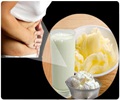Researchers have come up with a new, inexpensive tool for increasing milk production without resorting to growth hormones, according to a study published Monday.
They have discovered that suppressing the serotonin in mammary glands can boost milk output by 15 percent.Changes in the levels of this hormone can affect mood -- but scientists think they've found a way to do it without giving cows the blues.
"I don't know how you'd tell a depressed cow, but no ... (the drug) didn't get into the brain," said lead researcher Nelson Horseman of the University of Cincinnati's medical school.
Low serotonin in the brain has been associated with depression and other mood disorders.
It is also found in the intestinal tract where it is stored in blood platelets and released at wound sites to promote clotting and healing.
Horseman and his team found that serotonin is the chemical responsible for sending the signal to slow milk production.
Advertisement
They then tried to see if they could take this discovery and use it to improve dairy production and have patented a drug which appears to reduce serotonin in the mammary glands without altering brain chemistry.
Advertisement
"We would have to know whether or not it gets into milk and if it does whether it would get through the pasteurization process," he said in a telephone interview.
Current hormone therapies are too expensive for farmers in developing countries and are banned in Europe out of concerns that traces are found in the milk.
Horseman's drug produces the same increase in yield as growth hormones but is easier and cheaper to synthesize and can be given orally rather than through injections.
"Our ultimate goal would be to increase milk yield in a way that's effective without side effects," he said.
Results of the human study were published in Monday's early edition of Proceedings of the National Academy of Sciences.
Source-AFP
SRM/C











